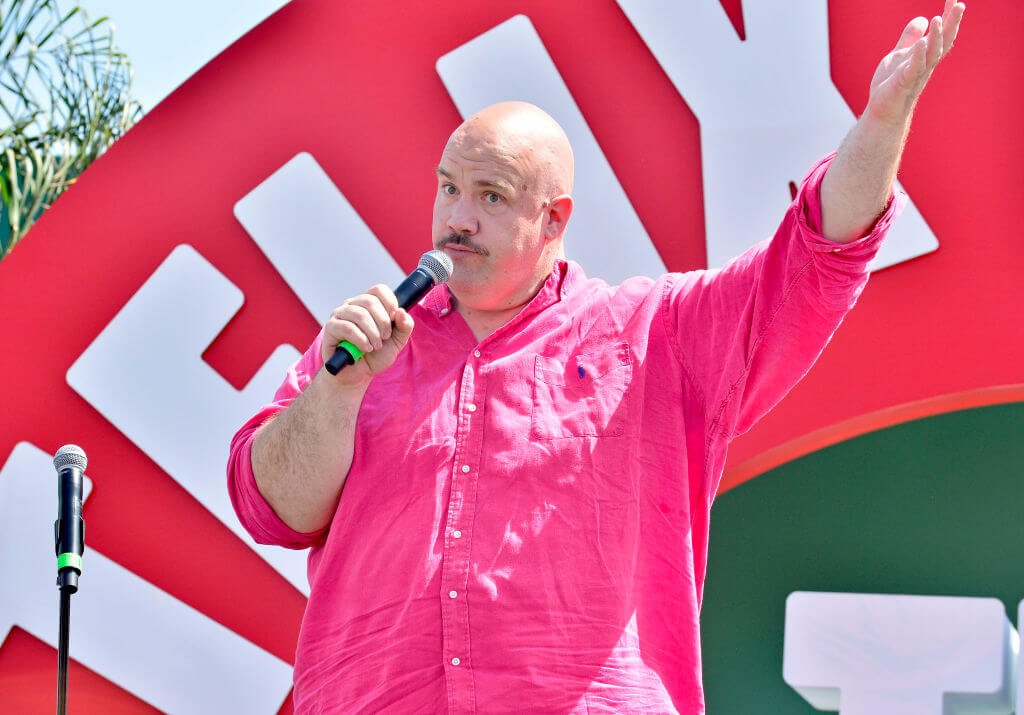How that Barbra Streisand ‘Yentl’ joke wound up in the year’s biggest gay rom-com
Guy Branum on ‘Bros,’ being gay and Jewish, and why the star of ‘Funny Girl’ is a lot like gravity

Guy Branum performs onstage during the WEHO Drag Brunch in Los Angeles. Photo by Jerod Harris/Getty Images for Netflix
There’s only one joke in “Bros” that Guy Branum wants credit for, and fittingly, it’s the movie’s most Jewish moment.
It lands in the final act of the gay romantic comedy. Branum, who is gay and Jewish, co-produced the film and plays a supporting role.
Fresh off a breakup, Bobby (played by Billy Eichner) picks up a guy at the gym while faking a deep, husky voice, but accidentally drops the guise in their postcoital reverie. Weirded out by the ploy, the guy makes him leave.
On his way out the door, Bobby notices a Barbra Streisand poster hanging on the wall, and the two briefly share a moment. Then it hits him: “This whole thing was kind of like ‘Yentl.’”
And scene!
“Billy and Nick wrote an amazing script with so many jokes in it,” Branum said, referring to “Bros” co-writers Eichner and Nicholas Stoller, “such that my job as onset punch-up person did not involve me writing a ton of jokes. But the ‘Yentl’ joke is 100% mine.”
Unlike Eichner’s Bobby, Branum’s Henry isn’t explicitly Jewish. It’s almost a waste, because musing about Jewish culture may be the very thing God put the veteran standup comic and author on Earth to do. And it really makes his mother so proud when he does.
Branum, 46, grew up in rural Northern California, in Yuba City, to a Jewish mother and a Southern Baptist father. Because the family was mixed — and not wealthy — they were self-conscious about being in the local Jewish community. So his mom inculcated him and sister into Judaism with books. He started down a path of halachic observance at UC Berkeley — only to hit a wall as he came to terms with his sexual orientation.
“So much of my journey with Judaism has been trying to reconcile the very structured, book-learning approach to it with a more functional human engagement with it,” he said.
He spoke with me about that journey, the Yeshiva University Pride Alliance case and (of course) Streisand.
You grew up in rural Northern California with one Jewish parent. How did developing your Jewish identity as an outsider in that community interact with your coming out and realizing you were gay?
One of the real tools that my mom offered was this awareness that every system has outsiders. For every system that seems like it works, there are people who are being screwed over by that system. It’s not something every kid hears, you know — especially not 40 years ago — and that really informed me.
Once I got to college, I had more of a Jewish community. And I cared about doing Judaism with integrity — the right way. I didn’t come out until law school. But after I came out, I said to my best friend, basically, that I was worried about being politically aware enough and responsible enough with my identity as a gay person. And she — a nice San Diego Jewess — was just like, “Well, you’re good at being a Jew. Do it that way.” For a very confused 23-year-old, having her say: Do it and care about it as much as you care about being Jewish, was really helpful.
I feel like Judaism has really informed my approach to how I present myself as a gay person in life. Represent your people, don’t hide, and protect other people in your community.
Do you go to shul these days? What do you do Jewishly?
I periodically get coaxed into it by friends. Moshe Kasher most years will ask me whether I’m fasting on Yom Kippur and I tell him that I’m not.
Coming out of the closet sort of problematizes a person’s relationship with Judaism. Judaism is about following a set of rules and I sort of fundamentally can’t follow one of those rules. I’ll say that to Moshe and he will tell me, there’s always a place for you in Judaism.
I’m not a member of any shul or anything like that. I think about it sometimes. But like, I never quite know how it fits into my life. I do relish communal celebrations of Judaism. Like, my two big events of the year are a Hanukkah party and a Seder.

I want to go back to that one law in Judaism that you can’t follow. Presumably you’re talking about the Torah verse that forbids gay anal sex. Tell me more about what you make of that conflict. How has it shaped your relationship with religious practice or with Jewish culture, or your Jewish identity personally?
The thing is, I knew about the regulation. I knew I was attracted to men in junior high. And I knew that it was socially forbidden, but I also knew that it was something that was forbidden by my religion.
It was one of the things that helped me stay in the closet. Judaism allowed me to say: “I have had a harder road stacked for me, but being inclined to have sex with men is not a violation of the law. Only having sex with men is a violation of the law. So as long as I just don’t have sex with men, I’m not violating the law. And I can be on the path.”
I was trying to journey toward more observance. I wanted more Judaism in my life. And I like the tension and ambiguity in Judaism — but I cannot be an observant Jew, so why try that much? And one of the nice things about meeting gay Jews who are observant is having my own 46-year-old conception of these things be challenged — to have somebody saying, “None of us are perfect Jews. We are just trying to do the best we can.” In the last year or so I have been challenged to engage with it more and rethink my approach.
Have you been following the YU Pride Alliance case at all, in which Yeshiva University is refusing to recognize an LGBTQ club on campus?
I have not. The first thing it makes me think of are the cases in the ’90s, when schools in the South were trying to have LGBTQ organizations at a time when it was still illegal to be gay. And Jeff Sessions, who was then attorney general of Alabama, was banning gay organizations because they were conspiracies to commit a crime.
What those students are doing is really brave. I think it is really unfortunate that you see the university trying to stop them. At the same time, it’s Yeshiva University. Of course they’re going to!
Barbra Streisand plays a small but key role in this movie. What does Streisand mean to you?
Look, mine was a journey to Streisand. My mom did not respect Streisand and I always identified as more of a Bette Midler man. But she is an icon. She is unapologetic. She is somebody who grew out of a world but always remained identified with and committed to where she came from. And what a rough journey that was for her when she wanted to become a performer. But like, we owe her forever for the first act of “Funny Girl.” She’s Streisand! She’s like gravity. She’s a fundamental force of our world.






















